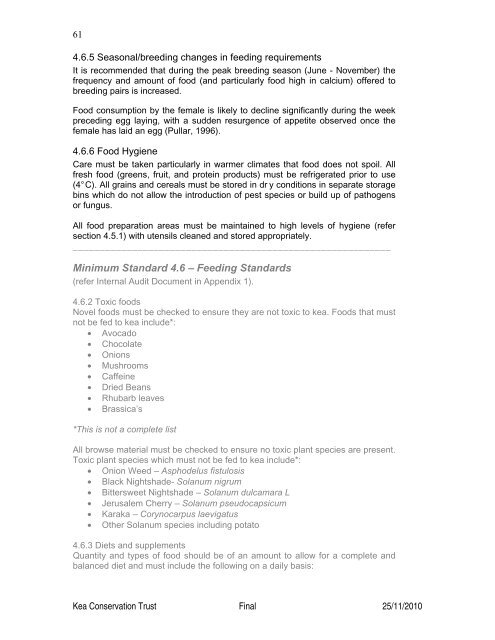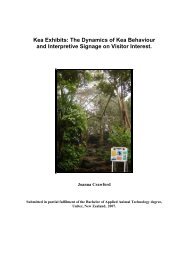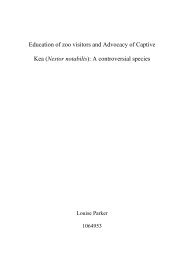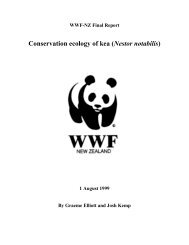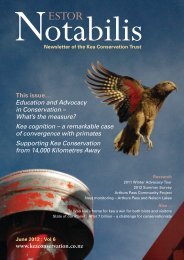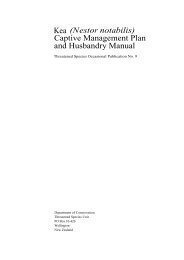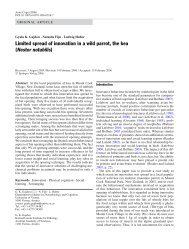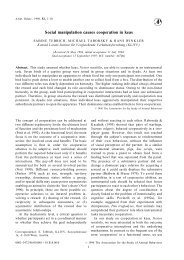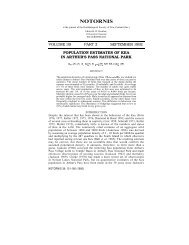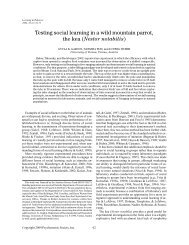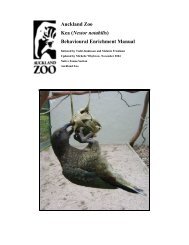(Nestor notabilis) Husbandry Manual - Kea Conservation Trust
(Nestor notabilis) Husbandry Manual - Kea Conservation Trust
(Nestor notabilis) Husbandry Manual - Kea Conservation Trust
Create successful ePaper yourself
Turn your PDF publications into a flip-book with our unique Google optimized e-Paper software.
61<br />
4.6.5 Seasonal/breeding changes in feeding requirements<br />
It is recommended that during the peak breeding season (June - November) the<br />
frequency and amount of food (and particularly food high in calcium) offered to<br />
breeding pairs is increased.<br />
Food consumption by the female is likely to decline significantly during the week<br />
preceding egg laying, with a sudden resurgence of appetite observed once the<br />
female has laid an egg (Pullar, 1996).<br />
4.6.6 Food Hygiene<br />
Care must be taken particularly in warmer climates that food does not spoil. All<br />
fresh food (greens, fruit, and protein products) must be refrigerated prior to use<br />
(4° C). All grains and cereals must be stored in dr y conditions in separate storage<br />
bins which do not allow the introduction of pest species or build up of pathogens<br />
or fungus.<br />
All food preparation areas must be maintained to high levels of hygiene (refer<br />
section 4.5.1) with utensils cleaned and stored appropriately.<br />
___________________________________________________________<br />
Minimum Standard 4.6 – Feeding Standards<br />
(refer Internal Audit Document in Appendix 1).<br />
4.6.2 Toxic foods<br />
Novel foods must be checked to ensure they are not toxic to kea. Foods that must<br />
not be fed to kea include*:<br />
• Avocado<br />
• Chocolate<br />
• Onions<br />
• Mushrooms<br />
• Caffeine<br />
• Dried Beans<br />
• Rhubarb leaves<br />
• Brassica’s<br />
*This is not a complete list<br />
All browse material must be checked to ensure no toxic plant species are present.<br />
Toxic plant species which must not be fed to kea include*:<br />
• Onion Weed – Asphodelus fistulosis<br />
• Black Nightshade- Solanum nigrum<br />
• Bittersweet Nightshade – Solanum dulcamara L<br />
• Jerusalem Cherry – Solanum pseudocapsicum<br />
• Karaka – Corynocarpus laevigatus<br />
• Other Solanum species including potato<br />
4.6.3 Diets and supplements<br />
Quantity and types of food should be of an amount to allow for a complete and<br />
balanced diet and must include the following on a daily basis:<br />
<strong>Kea</strong> <strong>Conservation</strong> <strong>Trust</strong> Final 25/11/2010


